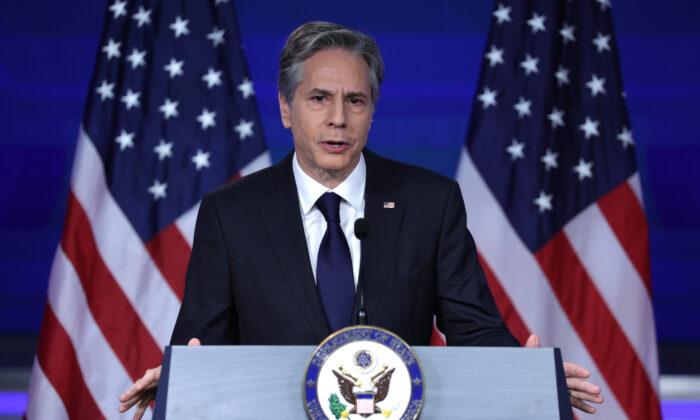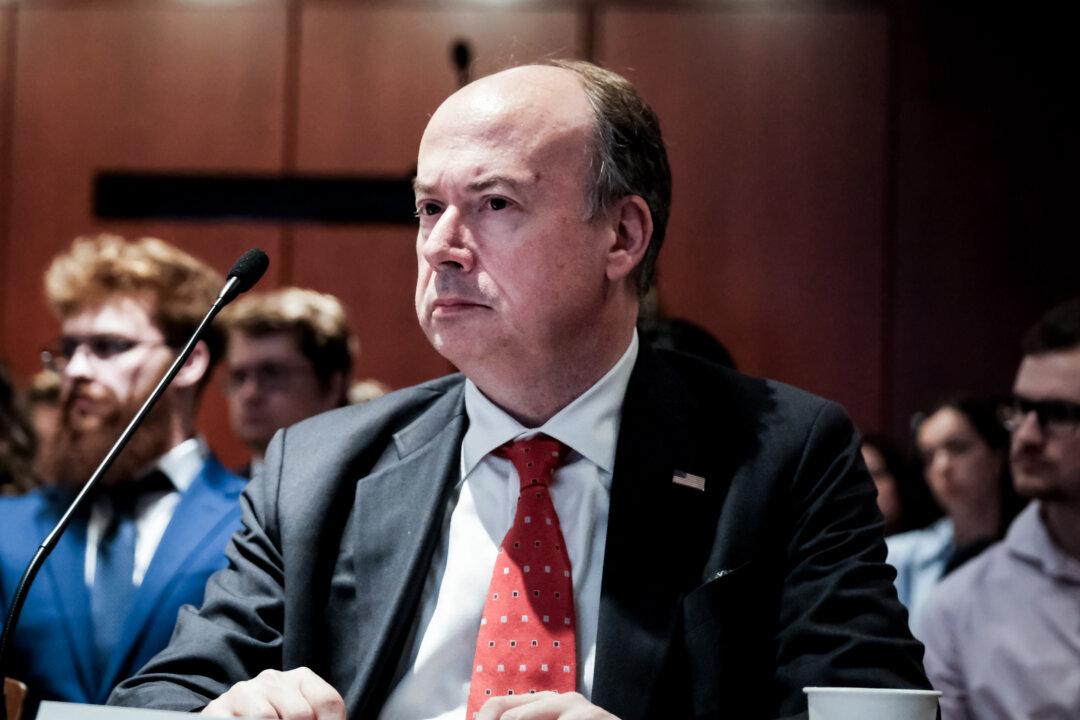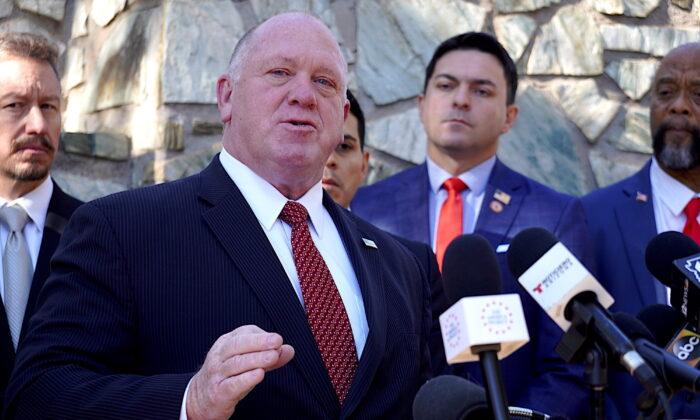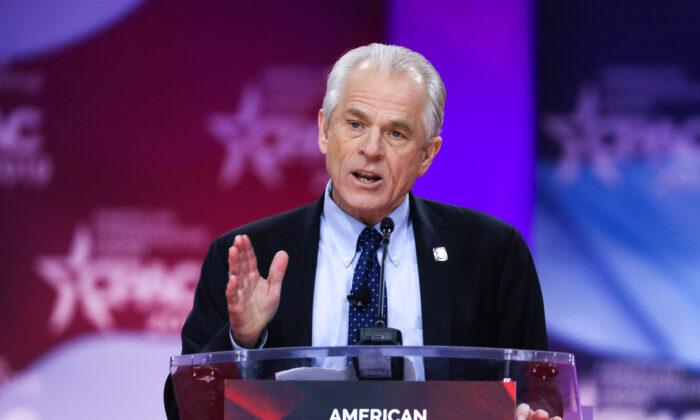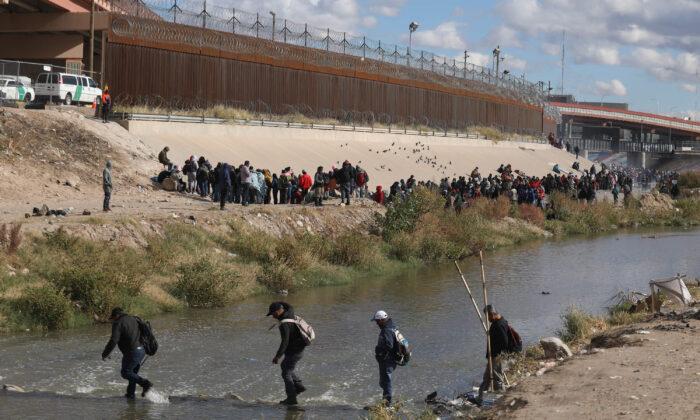The United States needs to decouple from China economically, politically, and technologically, Ian Easton, senior director of The Project 2049 Institute, a Virginia-based think tank focused on promoting American values and security interests in the Indo-Pacific region, told The Epoch Times in an interview.
Easton suggested that U.S. interactions with China are “a zero-sum game,” and said that it is “dangerous … to treat a strategic competitor, a radical political organization like the Chinese Communist Party like it’s normal, and like this is a country we can do business with.”
Easton also authored “The Chinese Invasion Threat: Taiwan’s Defense and American Strategy in Asia,” which, like “The Final Struggle” is published by Eastbridge Books, an imprint of the Taiwan-focused publisher Camphor Press.
An Illinois native, Easton has written that he “grew up in a family of cops” and previously lived in Taiwan for more than four years, in addition to studying in Shanghai. In his first book, “The Chinese Invasion Threat,” Easton wrote that he began thinking about the invasion threat faced by Taiwan after experiencing an air raid drill during the summer of 2005 in Taipei, where he was studying Mandarin.
“Classes had let out, and I was strolling down Ho-ping (Peace) Road on my way to the metro station when the piercing wail of an emergency alert siren cut through the sticky air,” Easton recalls in his first book. “I looked up into the sky, my eyes scanning for trouble. Having spent my formative years in rural Illinois, surrounded by cornfields, my brain was programmed to automatically assume that sirens meant tornados were coming. Take cover! But on this particular day the skies were dazzlingly blue, without a threatening cloud mass anywhere in sight. Armed police officers and soldiers suddenly materialized on the streets around me, seemingly out of nowhere.”
Of his early years and his decision to focus his studies on Taiwan and China, Easton told The Epoch Times, “I wanted to see the world from a very young age. I wanted to get out of those cornfields and travel and learn foreign languages and learn about other cultures. And the more I traveled, the more people I talked to, the more I read, the more clear it became, or at least it seemed to become, that China was the place to go, and then Taiwan was the place to go. That these were going to be some of the most interesting foreign policy challenges of our generation.”

US-China Relations A ‘Zero-Sum Game’
Referencing a May speech by Secretary of State Antony Blinken outlining the Biden administration’s China policy, Easton said that “President Biden and his foreign policy team have a very conflicted kind of policy” that is “a policy at war with itself.”In his recent speech, Blinken said, “The United States stands with countries around the world against the genocide and crimes against humanity happening in the Xinjiang region … we stand together on Tibet, where the authorities continue to wage a brutal campaign against Tibetans … and in Hong Kong, where the Chinese Communist Party has imposed harsh anti-democratic measures under the guise of national security.”
However, in the same speech, Blinken also said, “The United States does not want to sever China’s economy from ours or from the global economy … For our part, we want trade and investment as long as they’re fair and don’t jeopardize our national security … To the people of China: we’ll compete with confidence; we’ll cooperate wherever we can; we’ll contest where we must. We do not see conflict.”
Easton offered the following critique of the policy statement.
“Secretary of State Blinken’s recent China speech, he did, I think, very accurately, and correctly diagnose the problem. He described a genocidal regime [the CCP] that is hostile and that is undermining the free and open, liberal world order that the United States sought to create in the wake of World War II. But the problem and the contradiction comes when they [the Biden administration] then switch gears and talk about how we don’t want to decouple, we want to continue to trade with China. In fact, we’re willing to trade even more with China if China removes some of their predatory economic policies, and that the United States wants to find more areas to cooperate with the PRC [People’s Republic of China].
“To me that’s very contradictory, because you cannot compete, and you cannot defend yourself and cooperate at the same time. At a certain point, it becomes a zero-sum game. And if you continue to seek cooperation with the PRC, they will exploit that as an opportunity to undermine you. And that’s something that they’ve done very successfully throughout the history of US-PRC relations.”
Easton said that more U.S. cooperation with China “comes with a price, and the price is that the administration risks not doing everything that it could or should be doing to support human rights, for example, to support the defense of Taiwan, to beef up our own national security situation, which is, in my view, in a very troubled state right now. And this is why I think economically decoupling or moving in that direction is so important. And it’s not just economic decoupling. It’s also political decoupling. It’s technologically decoupling. It is looking at this challenge that we face, which is systemic, and it affects our entire society, and then starting to actually take real policy measures.”
The Epoch Times has reached out to the State Department for comment.

CCP Infiltration of American Markets and Infrastructure
Decoupling-related policy measures recommended by Easton include removing commercial electronics made by Chinese companies from the U.S. market. Chinese companies are, by Chinese law, answerable to the CCP.Easton writes in “The Final Struggle,” “We never think of our own homes as being on the frontlines of a war with China. Perhaps we should start. The CCP has developed countless ways to clandestinely set the foundations of the American universe trembling without firing a single rocket.”
The author told The Epoch Times, “Lenovo, for example, is a company that has been blacklisted by the Pentagon because of its close ties to the PLA [the People’s Liberation Army], the Chinese military, and yet Lenovo computers dominate the American commercial sector. They’re in homes and hospitals and grocery stores and clinics and offices and banks and police stations and fire stations across America.”
He pointed to the Chinese digital radio maker Hytera as another company in the U.S. market that poses a security threat, as well as smartphone maker Motorola Mobility and home appliance maker GE Appliances, which–though they continue to use previously trusted American brand names–are now, following buyouts, Chinese-owned companies.
“The Internet of Things, where your appliances are talking to each other and everything’s collecting data and sharing data to try to make your life easier, in theory, that’s not a bad thing, necessarily, if you’re comfortable with that,” Easton said. “But in practice, if all of those electronics are linked to the Chinese government, then that’s a serious problem. And unfortunately, that is the case today, where Chinese electronic systems which are known by the U.S. government to be under the control of the Chinese Communist Party and have strong links to the PLA, they’re dominating our entire society. And so far, Congress and the administration have not done anything to get those off the market.”
“We also suffer from the same problem in terms of our critical infrastructure,” Easton said, pointing to China-made smart cranes that are prevalent in United States container ports as an example.
In “The Final Struggle,” Easton notes that gantry crane-maker Shanghai Zhenhua Heavy Industries Company (ZPMC)—a Chinese state-owned enterprise and branch of the China Communications Construction Corp. (CCCC), which was blacklisted by the Department of Defense in 2020—continues to maintain coast-to-coast operations in the United States, supplying smart cranes that “are a fixture in nearly every American container port,” including those in Los Angeles, Long Beach (California), Oakland, Tacoma, Seattle, Philadelphia, Wilmington (North Carolina), Charleston (South Carolina), Jacksonville, Gulfport (Mississippi), Tampa Bay, Miami, and Elizabeth (New Jersey).
“Almost every container port in America is now dominated by a Chinese state-owned enterprise [ZPMC], which is linked to the PLA. It’s a very close relationship with the PLA. They’re smart cranes, they’re automated, and they’re connected to the internet,” Easton told The Epoch Times.
“And we have Chinese government employees that service those cranes and that are in all of our port facilities. And so I think that says something about how troubled our China policy has been, and how dangerous it is to treat a strategic competitor, a radical political organization like the Chinese Communist Party, like it’s normal, and like this is a country we can do business with. I don’t believe that’s the case. And so I think we need to start rolling that back.”

Xi Jinping Is ‘Nothing Like’ Americans
Easton told The Epoch Times that in addition to detailing the CCP’s infiltration into U.S. markets and infrastructure, “One of the aims I had for the book [“The Final Struggle”] and the research was to try to get a sense of what is Xi Jinping’s worldview, and what might the worldview be of those around him? What is the collective personality and outlook of the Chinese Communist Party?”Easton said, “I think it’s important for American policymakers in particular, but also for our friends and allies around the world to understand that Xi Jinping is not like them. He’s nothing like them at all. His lived experiences are very different than theirs. And the lived experiences of those in the Chinese Communist Party and the world outlook, the way they’ve been indoctrinated, the way they’ve been trained, the way they frankly have been brainwashed makes them very different actors than those in the West.”
He added, “Unfortunately, we have a terrible problem in Washington and elsewhere across the United States: mirror imaging. In other words, we’re not good at putting ourselves in the other guy’s shoes, or if you’re in the military, the other guy’s boots. And so we just project our own values onto our rivals and our adversaries and our enemies, and that’s a recipe for strategic disaster, miscalculation, and surprise and mistakes. And so I think that it’s important that we try to spend a little more time as an analytic community to talk more about these kinds of issues.”
In “The Final Struggle,” Easton details the turbulent early years and career trajectory of the CCP leader. One striking passage describes how Xi’s mother, Qi Xin, made the decision, following the expulsion from Beijing of Xi’s father, who was formerly a senior official in the CCP, to “turn her back on her firstborn son to save her own skin” by publicly disowning Xi during China’s tumultuous Cultural Revolution.
Easton writes, “Family ties were one of the cardinal sins of humanity according to Mao’s communist ideology, and they had to be expunged. At a rally, Xi Jinping was rounded up and paraded across a stage so that a rabid crowd—which included his mother—could excoriate him. He watched from the stage as his mom publicly disowned him, her fist raised as she chanted along with his persecutors, “Down with Xi Jinping!” He was fifteen.”
“When I read that story, it really struck me,” Easton told The Epoch Times. “It struck me that here is a leader who’s like pretty much everybody in his generation. In fact, almost every single person in China has been brutalized and traumatized by what the Chinese Communist Party did, what they continue to do. And I’m concerned that this will continue into the future, because what the Party is trying to do is socially reengineer all Chinese culture, all Chinese civilization, and all Chinese society. And to do that requires using extreme levels of oppression and violence and dividing families against each other, dividing communities against each other, removing religion, treating religion as if it’s what they call one of the poisons of society. It’s very traumatic, and what it does to people, I believe, is it does traumatize them and brutalizes them. And that certainly happened to Xi Jinping and it happened to hundreds of millions of people as well.”
Easton suggested that as a result of the trauma they have experienced, Xi Jinping and other senior officials are “deeply psychologically damaged.”
“Now we have an entire government, a ruling regime in Beijing, that is run by people who almost certainly have post-traumatic stress syndrome. They’re almost certainly deeply psychologically damaged. And that may account for some of the behavior we’re seeing, the wolf warrior diplomacy, very aggressive, very militant foreign policy,” Easton said.
“That may also account for these extremely horrific policies of genocide that they’ve undertaken in Xinjiang, in Tibet, and elsewhere. It may account for, and I think it does account for, this Orwellian mass surveillance program and the way that the Chinese Communist Party elite continues to oppress the people of China.”

US Should ‘Normalize Our Relationship with Taiwan’
Easton also spoke about U.S. policy toward Taiwan, a democratic island of 23 million people that China threatens to invade. The United States has not had official diplomatic relations with Taiwan since diplomatic relations were established with the Chinese regime in 1979.“This is a very troubled foreign policy issue for the United States,” Easton said. “It’s very problematic that, in the case of Taiwan, the U.S. does not support self-determination. We support self-determination, of course, for ourselves and for peoples around the world and countries around the world. And so I think it’s very problematic and hypocritical for the U.S. State Department to say we do not support self-determination for Taiwan.”
Pointing to Taiwan’s ranking as one of the world’s top 10 democracies by the Economist Intelligence Unit’s Democracy Index, Easton called the island “a shining success story.”
“And it is arguably the freest country in all of Asia, with the possible exception of Australia. And so it’s certainly in our principled interest to move to normalize our relationship with Taiwan and to treat Taiwan with the dignity and the respect that it deserves diplomatically,” he said.
What Winning Looks Like For The US
In “The Final Struggle,” Easton writes, “The ‘final struggle’ sought by Beijing would mean continuous revolution and political violence forever. The true struggle that will decide the future of the world is the struggle for increasingly open, moderate, and tolerant politics. If humankind is to ever be peaceful and prosperous in a broad and comprehensive sense, that is the struggle we must win.”Easton described to the Epoch Times what winning against the CCP would look like for the United States.
“A win for us means to spread democracy around the world. I think as Americans, we all believe in the idea that all men and women are created equal and that all people have these fundamental rights, what we call universal values, and that the individual matters more than the collective, that for the first time in human history, that’s what happened in the United States. We were the first country that could do that,” Easton said.
“For the first time ever, the individual and the dignity of the individual mattered more than the state. It mattered more than the empire. That we empowered people at the expense of their own governments. And we allowed people to decide their own political futures, and to give them sovereignty, and give them that basic dignity and to protect their human rights and to have rule of law.
“And so I think it’s certainly in our principled interest to defeat the spread of totalitarianism and authoritarianism and, ultimately, to allow for self-determination to thrive around the world.”
